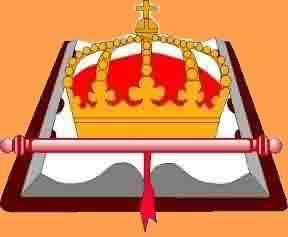 |
 |
What Is The Orange Institution ?
 |
 |
 |
![]()
|
The Loyal Orange Instituition is a worldwide Brotherhood which exists for the establishment and preservation of Civil and Religious Liberty and the Protestant Religion. The Institution is composed of Protestants, united and resolved to the utmost of their powers to support and defend the rightful Sovereign, the Protestant Religion in Church and State, the laws of the Realm, the Legislative Union, and the succesion to the Throne in the House of Windsor, BEING PROTESTANT and united further, for the defence of their own persons and properties, and the maintenance of public peace. It is excusively an Association of those who are attached to the principles of the Reformation, and will not admit to its Brotherhood, persons whom an intolerant spirit leads to persecute, injure or upbraid a man on account of his religious opinions. They associate also in honour of KING WILLIAM III, Prince of Orange, whose name they bear as supporters of his glorious memory. The Work of the Institution is carried on chiefly by means of Primary Lodges, of which there are a considerable number throughout the Country and the World, both Men's and Women's, it is into these Primary Lodges that candidates are admitted by a simple Biblical Ceremony into membership of the Loyal Orange Institution. In addition there are Junior Lodges in existance, which cater for the younger people, providing an excellent training ground in preparation for membership of the Senior Lodges, and in educating them in the truths of the Bible and in Protestant and Evangelical principals. ORIGIN ... "THE ORIGIN AND THE ANCESTRY OF KING WILLIAM III, PRINCE OF ORANGE" Ther are few historical place names harder to identify and to locate for the average man than "Orange", with possible exceptions of "Holland", "Burgundy", an "Flanders", and of course "Ulster". Yet While these last four Provinces have changed their boundaries frequently in the last thousand years, Orange has remained located where it always has been. Orange gave its name to a line of princes, which occupies the throne of the Netherlands today, and one of them was also King of Great Britain and Ireland. From that one Prince of Orange derives the name that we bear, and the colours that we wear. For the further happy accident by which the name of a fruit reproduces the name of a city has supplied the supporters of the Orange name, both in the Netherlands and in our English speaking world, with an appropriate party colour. We are Orangemen, and there have always been Orangeists in Holland. WILLIAM IS INVITED TO ENGLAND
At the request of many prominent members of Nobility and Clergy, the Prince of Orange landed at Brixham, Devon, on November 5th 1688, he had brought with him a large expeditionary force. The day before William had celebrated his 38th birthday. The purpose of this expedition was to curtail James the Second's tyrannical rule, to end the prorogation of Parliament and to prevent Britain from acceding to the political and religious aspirations of Louis XIV of France. The Prince's expedition brought about the Glorious Revolution of 1688 and succeeed in guaranteeing certain rights and privileges which, are often taken for granted. These rights and privileges are embodied in the Bill of Rights of 1691 and the Act of Settlement of 1701 and in particular stress that the British Monarch cannot become, or marry, a member of the Church of Rome. THE FIRST ORANGE ASSOCIATION Marching to Exeter, known to the Stuarts as the "Loyal City", William soon found himself presiding over what must have been the first "Orange" meeting on record. An Orange Association was founded in Exeter Cathedral on the 12th November 1688, in the presence of William, Prince of Orange. The Laws and Ordinances were drawn up by Dr. Gibert Burnet, later Bishop of Salisbury and William's chaplain and confidant, who had been with him at the Hague. This Orange Association was an "engagement of the Nobles, Knights, and Gentlemen of Exeter to assist the Prince in the defence of the Protestant Religion". The closing word's of the Prince's speech, which would today be termed the Worshipful Master's Inaugural Address, were:- "since God is pleased that we shall make preservation and happiness, let us not neglect making use of human means, and not expect miracles for our use of this gracious opportunity; but with prudence and courage put in execution our honourable purposes. Therefore, Gentlemen, friends, and fellow-Protestants, we bid you, and all your Followers, most heartily welcome to our court and camp". The response of these first "Orangemen" to their first "Worshipful Master", to use later language with which all are familiar, was as follows:- "We, whose names are hereunto subscribed, who have now joined the Prince of Orange for the defence of the Protestant Religion, and for maintaining the ancient Government, Laws and Liberties of England, Scotland and Ireland, do engage to Almighty God, to his Highness the Prince, and to one another, to stick firm to this Cause in defence of it, and never to defect from it, till the Religion, Laws and Liberties are so far secured for us in a Free Parliament that they shall no more be in danger of falling into Popery and slavery". Thus were the seeds of the Orange Institution sown. It exists today to serve the same noble purposes of promoting the Protestant Faith, and welding together the bonds of the Commonwealth. Orangeism is both Christian and Patriotic, and the more fully its principles are diffused and prayerfully acted upon in all the relations of life - domestic, social, and national - the more its objects will be realised for the good and betterment of the whole community and the entire World. "The Protestant Religion and Liberties Of Engalnd I Will Maintain" William III, Prince of Orange |

![]()